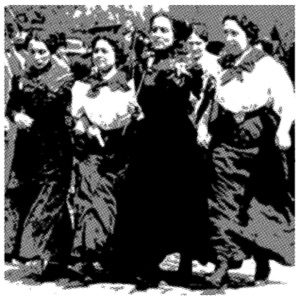
by Alice Embree
The Feminist Action Committee of Democratic Socialists of America (DSA) showed the film, “She’s Beautiful When She’s Angry,” last night in Austin. We were raising funds for abortion access — for the Lilith Fund and for Frontera Fund. I wanted to share comments I made after the film, reflections on the women’s liberation movement of the 70s and on the challenges of today.
I remember the consciousness raising rooms with women talking in 1970, electricity in the air. We were beautiful. I remember the moments when someone would say, “That happened to me.” And someone else would say, “Me, too.” When we realized that we faced barriers as women that we hadn’t even seen before. When we realized that women’s voices were frequently silent in rooms that included men, even in rooms full of radicals intent on ending the war. Women typed the leaflets; we didn’t give the speeches. We rarely stepped up into leadership until women’s liberation came along.
Our self-discovery required us to learn from each other, tell our own stories, hear our sisters’ stories. That’s how we began to connect the dots and understand that a system of patriarchy had molded our ideas of what was possible. We intended to break down those barriers.
When I met Glenn Scott, now co-chair of Austin’s DSA chapter, I was in a group called Austin Women Workers. Here’s what our leaflet said in 1975:
We are all workers although some of us are in the role of unpaid mothers and housekeepers.
We know that the struggle for women’s liberation is a revolutionary struggle because the realization of our demands will bring about a basic transformation in our society. We cannot settle for less than the possibility of engaging in meaningful and creative activity: the opportunity to develop… skills…; adequate compensation…; free, loving care for children; control over the reproductive processes; sexual self-determination for all women and especially for lesbians; the development of personal relationships based on mutual responsibility; and the power to make decisions about all areas of our lives…
We also know that the liberation of women will not occur until all people are free. We do not intend to gain a greater degree of independence at the expense of other oppressed people. Therefore, we struggle against all forms of racism, capitalism, and imperialism. Our most important work is the creation of a society in which every person is provided with the basic necessities of food, clothing, and shelter; every person participates in the decision-making process; and every person is able to expand his or her consciousness to the fullest extent.
As part of the 70s Women’s Liberation Movement we began to knock down employment barriers in Austin, demand birth control choices, challenge abortion laws, organize rape crisis centers and speak out against domestic abuse. Soon, many of us had children while holding down full time jobs. We scrambled for child care and summer camps. Betty Friedan had framed a question in 1963 in The Feminine Mystique written from her suburban vantage point, “Is this all there is?” For most of us in the 80s, it was more like, “Isn’t this too much?”
The point of a socialist analysis is “yes, it is too much.” To expect women to work at lower wages, often taking on the major responsibilities of childcare and elder care in families. With skyrocketing childcare costs, hit or miss health care, even sales taxes on tampons. Yes, it is too much.
The imprint of our work in women’s liberation many decades ago can be seen now in DSA.
In our DSA Feminist Action Committee, we look at intersectionality of oppression – a big word way of saying that oppression can take many forms – class, race, gender identity, citizen status to name a few. We know we can’t understand class without understanding race. We can’t only look at patriarchy without understanding how it intersects with capitalism. In DSA, our organization reminds us to Step Up if you haven’t spoken, to Step Back if you have already spoken. We use something called Progressive Stack in discussions to amplify the voices of women, people of color, and queers.
When we organize for Medicare For All, we know that is a feminist issue. When we win a Paid Sick Days Ordinance, we know that is for women, and for their children. Reproductive justice is a socialist issue. Poverty is a feminist issue. Capitalism has rewarded the few and failed to deliver on basic needs for the many. Patriarchal privilege has warped our culture and our choices as women. As Socialist Feminists, we intend to break down barriers and transform our society in revolutionary ways by fighting for democratic socialism.

